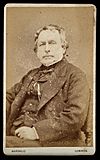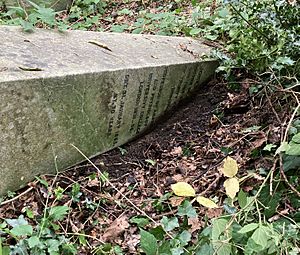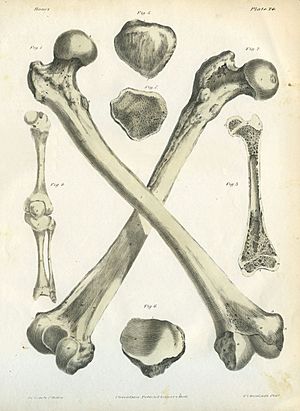Jones Quain facts for kids
Quick facts for kids
Jones Quain
|
|
|---|---|
| Born | November 1796 |
| Died | 31 January, 1865 (aged 68–69) |
| Nationality | Irish |
| Alma mater | Trinity College Dublin |
| Scientific career | |
| Institutions | University of London |
Jones Quain (pronounced "kwan") (November 1796 – January 31, 1865) was an important Irish scientist. He was known for studying anatomy, which is the study of the body's structure. Quain taught at the University of London as a professor. He also wrote a famous book called Elements of Anatomy, first published in 1828.
Contents
About Jones Quain's Life
Jones Quain was born in November 1796 in Mallow, Ireland. He was the oldest son of Richard Quain. He got the name "Jones" from his mother's family.
Early Education and Studies
Quain started his schooling at Adair's school in Fermoy. Later, he went to Trinity College Dublin. In 1814, he was chosen as a Scholar, which was a very high academic honor.
He earned his first degree in arts. In 1820, he became a bachelor of medicine. He traveled to other countries to study medicine, spending time in Paris. While there, he helped translate a medical book called Martinet's Manual of Pathology.
Teaching Career in London
In 1825, Quain moved to London. He became an anatomy teacher at the Aldersgate Street school of medicine. Another famous teacher there was William Lawrence.
During this time, Quain published his important book, Elements of Anatomy. This book became a standard textbook for students learning about the human body. It was used in many English-speaking countries.
In 1831, Quain became a professor at University College London. He taught general anatomy. His brother, Richard Quain, also worked there as a demonstrator. Jones Quain also gave lectures on physiology, which is the study of how the body works.
Later Life and Retirement
Quain left his teaching job at University College in 1835. In the same year, he became a member of the senate of the University of London. This group helped guide the university.
For the last twenty years of his life, Quain lived mostly in Paris. He spent his time reading and studying science and literature. He was known for being a very smart and cultured person.
Jones Quain passed away on January 31, 1865. He was buried in Highgate Cemetery in London.
Jones Quain's Important Books
Jones Quain wrote several important medical books that helped many students and doctors.
- Elements of Descriptive and Practical Anatomy: This was his most famous work, first published in 1828. It was a detailed textbook about the human body. It was updated many times, with new editions coming out even after his death.
- Martinet's Manual of Pathology: Quain translated and added notes to this book by Louis Martinet. It was about pathology, the study of diseases.
- A Series of Anatomical Plates: With Erasmus Wilson, Quain created a collection of detailed drawings of the human body. These "anatomical plates" helped students see and understand the different parts of the body.
 | Sharif Bey |
 | Hale Woodruff |
 | Richmond Barthé |
 | Purvis Young |




